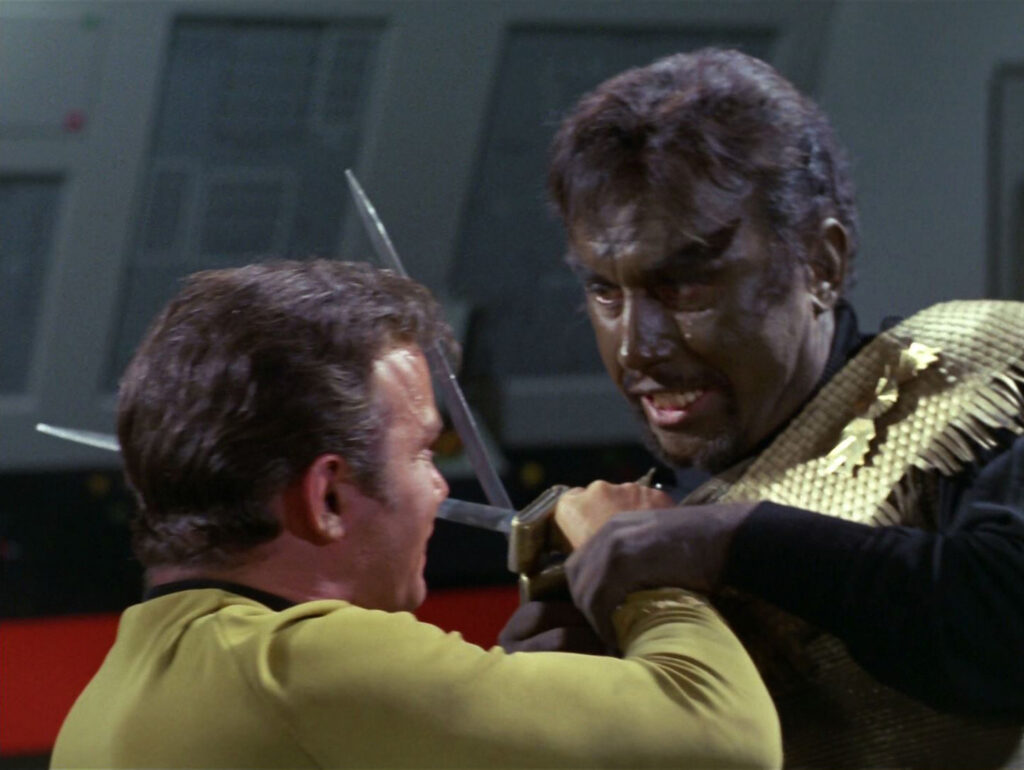The Klingons have been transported aboard the Enterprise. Tension is high, mistrust ubiquitous, hostilities imminent. An alien life force that feeds on intense emotion has replaced futuristic weapons with bloodier antecedents. Knives, swords, and spears abound. The explicitly wounded are avenged, but in ways unknown to even 25th century science, come back to life and continue fighting. The alien—an unimpressive twinkle by the standards of 21st century special effects—glows happily, knowing that the fighting will continue unabated forever. The more violence, the more the alien feeds, thrives, and grows.
In the mid 1960s the analogy to the cold war was clear, even to this 12-year-old viewer. Pointless violence begets pointless violence. Was it just me or did those Klingons look like Cossacks? And weren’t their accents and syntax vaguely Russian?
Eventually, after intensely escalating anger and emotion, the Klingon commander determines what is going on, that the alien thrives on violence, feeds on rage and fury. The Klingon commander instructs his fighters to lay down their weapons. In a phrase I remember half a century later, he instructs his fighters: “only a fool fights in a burning house.” Captain Kirk also commands his crew to put away their swords, to forgive, and to laugh. The alien, in defeat, leaves the spaceship, presumably to find two other opposing races whom he can encourage to fight endlessly and meaninglessly somewhere else in the universe.
Has the alien by any chance alighted at the school where your children attend? Do students there compete with one another for grades, rank in class, positions of leadership? Do students sabotage samples in chemistry class? Do students refuse to help one another study knowing that a benefit for one is a disadvantage for another? Are students focused on being admitted to their first choice, highly selective college to the exclusion of reading, thinking, and learning? Are students caught up in an endless cycle of competition and meanness?
In their houses of worship, our kids are taught to “do unto others,” to “turn the other cheek,” to “do unto the least of these.” Whereas on Monday, the arithmetic is clear: helping someone else is equivalent to hurting yourself. There can be only one Number One. (Although some high schools have gone so far as to make multiple valedictorians.) If your daughter helps a classmate get a better grade, your daughter’s ranking can only move down as a result.
Hobbes wrote “bellum omnium contra omnes” or “the war of all against all.” And the Darwinian paradigm is clear: asteroid 1, dinosaurs 0. But to the best of my knowledge, your child’s high school is located neither in mid-17th century English philosophy-land or at the end of the Cretaceous 65 million years ago this coming Thursday. Wouldn’t you rather your kids have a spoonful of cooperation to go along with their three-square meals a day of competition?
Eagles frequently have two chicks, one of whom they feed and care for, the other frequently starves to death–an “heir and a spare” having nothing to do with succession to the English throne. “In the nest the oldest eaglet can act aggressively toward their siblings. The older, and larger eaglet often tries to dominate or even kill its sibling(s).”
Which doesn’t sound that far from students from the same neighborhood, same school, same family jockeying for position, fighting one another for rank in class. Do you truly want your children emulating birds being fed carrion? I didn’t think so.
I would argue that your child knowing her multiplication tables does not prohibit my child from knowing what three times seven is. (No spoilers: answer next week.)
Your decisions come down to your fundamental beliefs about two related issues:
- Do you feel there is enough? Or do you, to the contrary, feel that scarcity is the paradigm, that the fridge will soon be empty, that the sky is falling, that the end of the world is at hand, that we will soon be migrants trudging from one desolate landscape to the next?
- Do you feel that your child is competent to make her way in the world? Or do you feel that she needs your help inflating her credentials, scamming her way into a highly selective college where she will be overmatched and unhappy? Do you feel that she will need your help forever and that you are therefore justified in encouraging her to gain an unfair advantage over her peers?
Without humor or irony, I want my kids to feel like the world is a safe place and that they are capable of making their way on their own. I want them to feel safe and secure. And I want them to feel competent. I want my kids to feel that when they come to a wall that their only concern will be determining exactly how they will get to the other side. Will they climb over the wall, dig under it, or walk around it? Or will they just blow it up?
But I don’t want my kids to view their classmates as objects–as walls to be climbed over or destroyed.
Posturing and competing endlessly to be first in their class, admitted to a HSC, advance only by climbing over peers, makes as much sense as stabbing enemy combatants who repeatedly come back to life.






One thought on “World View”
Excellent. Cooperation often wins over outright competition.And even in competition, team members who know how to cooperate win over teams whose members are each striving for individual success.
There does come a point where the lesson doesn’t work, but it’s far beyond the middle school or high school.
Those who study economics, with its ironclad postulate of fundamental scarcity gradually come to be skeptical of cooperation. And law students learn how cooperation is only momentary and contingent / transactional. And beware the pre-med students.